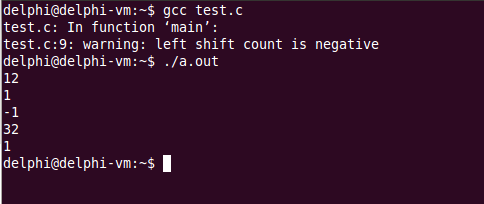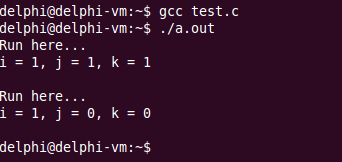Article catalogue
3, Bit operation and logic operation
1, Bitwise operator analysis
- Bitwise operators in C language
Bit operators directly operate on bit bits, which is the most efficient.
| & | Bitwise AND |
| | | Bitwise OR |
| ^ | Bitwise XOR |
| ~ | Reverse |
| << | Shift left |
| >> | Shift right |
- Move left and right attention points
- Left operand must be of integer type
- char and short are implicitly converted to int and then shifted
- The range of right operand must be: [0,31]
- Shift left operator < < shifts the binary bit of the operand to the left
- Rule: discard the high order and make up 0 for the low order
- Shift right operator > > shifts the binary bit of the operand to the right
- Rule: the high bit is used to fill the symbol bit, and the low bit is discarded
- Left operand must be of integer type
The following code:
#include <stdio.h>
int main()
{
printf("%d\n", 3 << 2);
printf("%d\n", 3 >> 1);
printf("%d\n", -1 >> 1);
printf("%d\n", 0x01 << 2 + 3);
printf("%d\n", 3 << -1); // oops!
return 0;
}
The following is the output result:

Note that the priority of four operations is greater than that of bit operations, so the result of 0x01 < < 2 + 3 is 32. Also, the range of the right operand must be: [0,31]. If it is not within this range, the output result of the program is determined by different types of compilers, and the result will be uncertain, just like 3 < < - 1 in this code.
2, Tips
- Error proofing criteria:
- Avoid bitwise operators, logical operators and mathematical operators appearing in the same expression at the same time
- When bit operators, logical operators and mathematical operators need to participate in the operation at the same time, try to use parentheses () to express the calculation order
- Tips:
- Shifting n bits to the left is equivalent to multiplying 2 to the nth power, but the efficiency is higher than that of mathematical operators
- Shifting n bits to the right is equivalent to dividing by 2 to the nth power, but it is more efficient than mathematical operators
Here is a code for exchanging the values of two integer variables:
#include <stdio.h>
#define SWAP1(a,b) \
{ \
int t = a; \
a = b; \
b = t; \
}
#define SWAP2(a,b) \
{ \
a = a + b; \
b = a - b; \
a = a - b; \
}
#define SWAP3(a,b) \
{ \
a = a ^ b; \
b = a ^ b; \
a = a ^ b; \
}
int main()
{
int a = 1;
int b = 2;
//printf("a = %d\n", a);
//printf("b = %d\n", b);
SWAP1(a,b);
printf("a = %d\n", a);
printf("b = %d\n\n", b);
a = 1;
b = 2;
SWAP2(a,b);
printf("a = %d\n", a);
printf("b = %d\n\n", b);
a = 1;
b = 2;
SWAP3(a,b);
printf("a = %d\n", a);
printf("b = %d\n\n", b);
return 0;
} The first method needs to introduce third-party variables. The second method may lead to boundary crossing problems. The third method is more efficient and does not need to introduce third-party variables.
Note the third method: execute a = a ^ b; After, b = a ^ b; It is equivalent to b = a ^ b ^ b; First calculate the following, that is, b = a ^ 0, and the result is b = a; Then execute a = a ^ b; Equivalent to a = a ^ b ^ b, i.e. a = a ^ b ^ a, obviously the result is B.
Tips:
A XOR 0 equals a and a XOR 1 equals non-a.
3, Bit operation and logic operation
- Bit operation is different from logical operation:
- There is no short-circuit rule for bit operation, and each operand participates in the operation
- The result of a bit operation is an integer, not 0 or 1
- Bit operation priority is higher than logic operation priority
Here's another judgment condition for confusing change:
#include <stdio.h>
int main()
{
int i = 0;
int j = 0;
int k = 0;
if( ++i | ++j & ++k )
{
printf("Run here...\n");
}
printf("i = %d, j = %d, k = %d\n\n", i, j, k);
i = 0;
j = 0;
k = 0;
if( ++i || ++j && ++k )
{
printf("Run here...\n");
}
printf("i = %d, j = %d, k = %d\n\n", i, j, k);
return 0;
}
The following is the output result:

It can be seen that if + + I | + + J & & + + k is wrongly written as + + I | + + J & + K, although they can run, the execution details are different, and bug s may appear in the actual project, which is not easy to check.
4, Summary
- Bitwise operators can only be used with integer types
- The range of right operands for shift left and shift right operators must be [0, 31]
- There is no short circuit rule for bit operations, and all operands are evaluated
- The efficiency of bit operation is higher than that of four operations and logic operation
- Operation priority: four operation > bit operation > logic operation